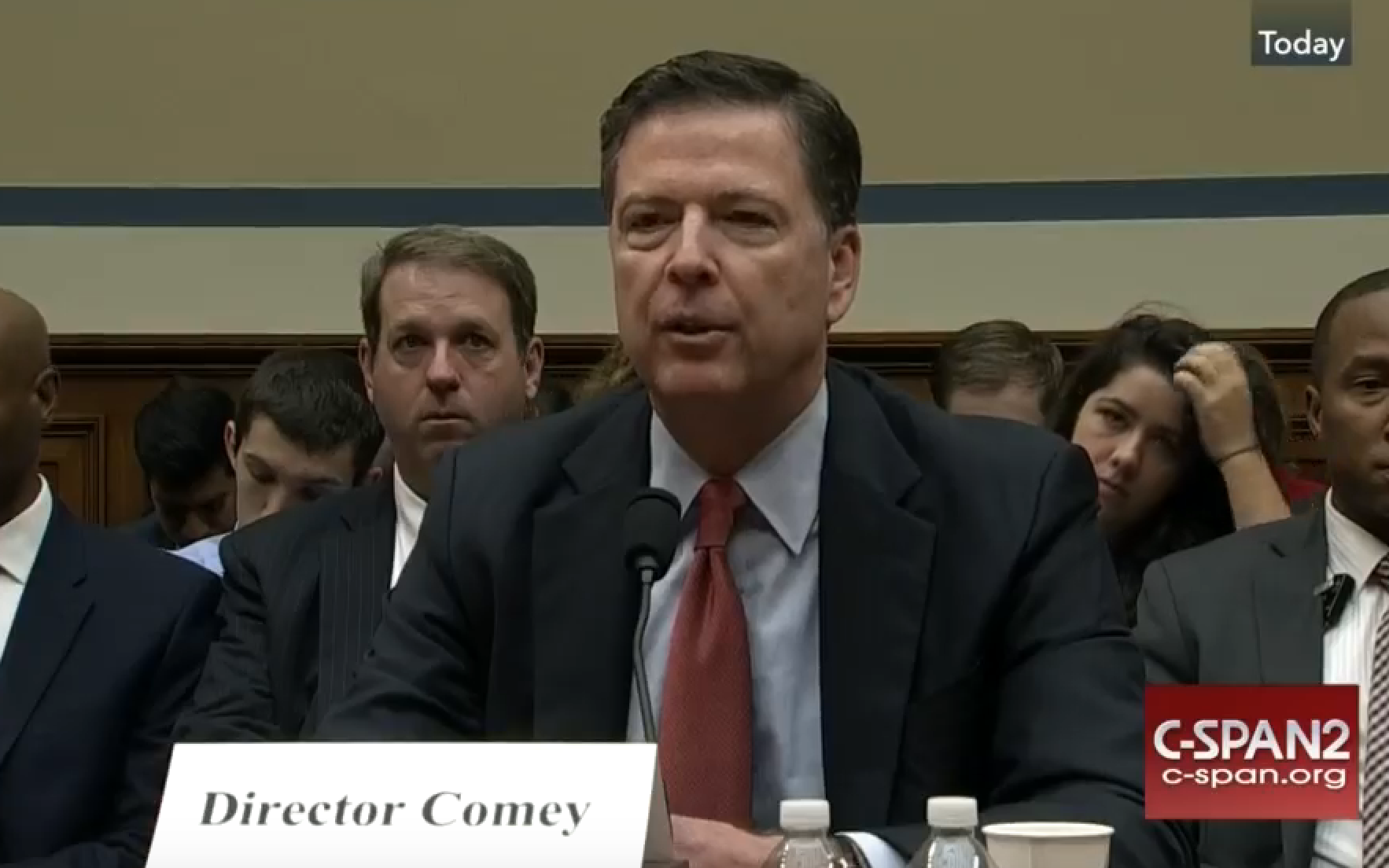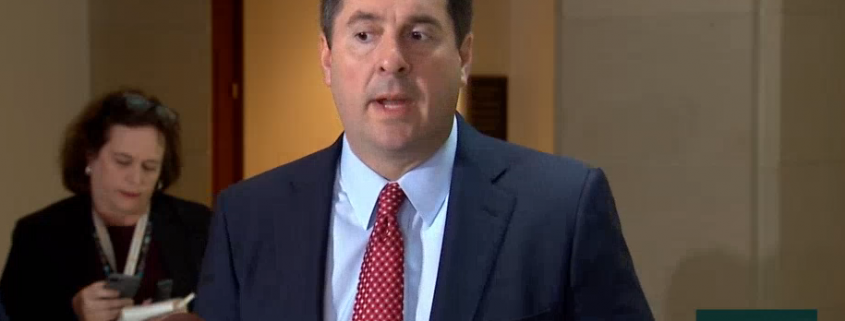I did four — count them! four! — interviews on the Russian hearing yesterday. And one thing I realized over the course of the interviews is that people were far more impressed with Adam Schiff’s opening speech than they should have been.
I want to look closely at this passage which — if it were accurate — would be a tight little presentation of quid pro quo tied to the change of platform at the July 18-21, 2016 RNC. But it’s not. I’ve bolded the two claims that are most problematic, though the presentation as a whole is misleading.
In early July, Carter Page, someone candidate Trump identified as one of his national security advisors, travels to Moscow on a trip approved by the Trump campaign. While in Moscow, he gives a speech critical of the United States and other western countries for what he believes is a hypocritical focus on democratization and efforts to fight corruption.
According to Christopher Steele, a former British intelligence officer who is reportedly held in high regard by U.S. Intelligence, Russian sources tell him that Page has also had a secret meeting with Igor Sechin (SEH-CHIN), CEO of Russian gas giant Rosneft. Sechin is reported to be a former KGB agent and close friend of Putin’s. According to Steele’s Russian sources, Page is offered brokerage fees by Sechin on a deal involving a 19 percent share of the company. According to Reuters, the sale of a 19.5 percent share in Rosneft later takes place, with unknown purchasers and unknown brokerage fees.
Also, according to Steele’s Russian sources, the Trump campaign is offered documents damaging to Hillary Clinton, which the Russians would publish through an outlet that gives them deniability, like Wikileaks. The hacked documents would be in exchange for a Trump Administration policy that de-emphasizes Russia’s invasion of Ukraine and instead focuses on criticizing NATO countries for not paying their fare share – policies which, even as recently as the President’s meeting last week with Angela Merkel, have now presciently come to pass.
In the middle of July, Paul Manafort, the Trump campaign manager and someone who was long on the payroll of Pro-Russian Ukrainian interests, attends the Republican Party convention. Carter Page, back from Moscow, also attends the convention. According to Steele, it was Manafort who chose Page to serve as a go-between for the Trump campaign and Russian interests. Ambassador Kislyak, who presides over a Russian embassy in which diplomatic personnel would later be expelled as likely spies, also attends the Republican Party convention and meets with Carter Page and additional Trump Advisors JD Gordon and Walid Phares. It was JD Gordon who approved Page’s trip to Moscow. Ambassador Kislyak also meets with Trump campaign national security chair and now Attorney General Jeff Sessions. Sessions would later deny meeting with Russian officials during his Senate confirmation hearing.
Just prior to the convention, the Republican Party platform is changed, removing a section that supports the provision of “lethal defensive weapons” to Ukraine, an action that would be contrary to Russian interests. Manafort categorically denies involvement by the Trump campaign in altering the platform. But the Republican Party delegate who offered the language in support of providing defensive weapons to Ukraine states that it was removed at the insistence of the Trump campaign. Later, JD Gordon admits opposing the inclusion of the provision at the time it was being debated and prior to its being removed.
Later in July, and after the convention, the first stolen emails detrimental to Hillary Clinton appear on Wikileaks. A hacker who goes by the moniker Guccifer 2.0 claims responsibility for hacking the DNC and giving the documents to Wikileaks. But leading private cyber security firms including CrowdStrike, Mandiant, and ThreatConnect review the evidence of the hack and conclude with high certainty that it was the work of APT28 and APT29, who were known to be Russian intelligence services. The U.S. Intelligence community also later confirms that the documents were in fact stolen by Russian intelligence and Guccifer 2.0 acted as a front. [emphasis on most problematic claims mine]
What Schiff tries to do here is suggest that the Russians offered Trump kompromat on Hillary, Trump’s team changed the GOP platform, and then in response the Russians started releasing the DNC emails through Wikileaks.
Later in the hearing, several Republicans disputed the nature of the change in the platform. Both in and outside of the hearing, Republicans have noted that the changed platform matched the policy in place by the Obama Administration at the time: to help Ukraine, but stop short of arming them. All that said, the story on this has clearly changed. The change in the platform clearly shows the influence of Russophiles moving the party away from its hawkish stance, but it’s not enough, in my opinion, to sustain the claims of quid pro quo. [Update: One of the outside the hearing arguments that the platform was not weakened is this Byron York piece b linked, which argues the platform actually got more anti-Russian.]
The bigger problem with Schiff’s neat narrative is the way it obscures the timeline of events, putting the release of DNC emails after the change in platform. That is true with regards to the Wikileaks release, but not the Guccifer 2 release, which preceded the platform change. Moreover, the references in Steele’s dossier Schiff invokes are not so clear cut — the dossier alleges Russia offered kompromat on Hillary unrelated to the stolen emails before any discussion of the Wikileaks emails. I’ve put what Schiff’s timeline would look like if it were not aiming to play up the quid pro quo of the RNC below (note this timeline doesn’t include all Steele reports, just those specifically on point; see also this site for a comprehensive Guccifer related timeline). It shows several things:
- The changes to the platform preceded the meetings with Sergey Kislyak. Indeed, the first public report on the change in platform even preceded the Kislyak meetings by a day.
- The stolen documents began to be released well before the platform got changed.
- The early Steele report on discussions of sharing a dossier of kompromat on Hillary pertains to a dossier dating back decades (even though these reports all post-date the first Guccifer releases, so could have included a discussion of hacked materials). The first explicit reference to the DNC hack comes after Wikileaks started releasing documents (and earlier reports which ought to include such references don’t).
- The later Steele report tying the Wikileaks release to a change in policy came after the policy had already changed and documents had already been released.
- The alleged quid pro quo tied to the early July Carter Page meeting was for the lifting of sanctions, not the shift on NATO and Ukraine; the Steele dossier describes the latter as the quid pro quo in exchange for the Wikileaks release only after the emails start coming out from Wikileaks.
Also note: the report that first ties Wikileaks (but not Guccifer) to a quid pro quo is one of the reports that made me raise questions about the provenance of the report as we received it.
This is not lethal for the argument that the Trump campaign delivered on a quid pro quo. For example, if there was extensive coordination, Trump could have changed his policy in March after learning that the Russian military intelligence hack — the one allegedly designed to collect documents to leak — had started. Or perhaps the Guccifer leaks were a down-payment on the full batch. But there’s no evidence of either.
In any case, the narrative, as laid out by Adam Schiff, doesn’t hold together on several points. Trump’s team has not yet delivered on the quid pro quo allegedly tied to the Rosneft brokerage fees that were paid to someone (it’s not public whom) in December — that is, the lifting of sanctions. As laid out here, the descriptions of an offer of a dossier of information on Hillary prior to the Republican platform pertained to stuff going back decades, not explicitly to Wikileaks; the shift of discussion to Wikileaks only came after the emails had already appeared and any Ukraine related policy changes had already been made.
There’s plenty of smoke surrounding Trump and his associates. It doesn’t require fudging the timeline in order to make it appear like a full quid pro quo (and given Jim Comey’s reliance on “coordination” rather than “collusion” in Monday’s discussion, it’s not even clear such quid pro quo would be necessary for a conspiracy charge). Adam Schiff can and should be more careful about this evidence in future public hearings.
Update: Given how remarkably late the references to the stolen emails are in the dossier, I’m linking this post showing how later entries included a feedback loop.
March 19: John Podesta phished (DNC compromise generally understood to date to same time period).
March 31: Trump reportedly embraces pro-Russian stance in foreign policy meeting with advisors.
April 19th: DCLeaks.com registered.
June 8th: DCLeaks.com posts leaks (from post dates).
June 13th: First archived record of DCLeaks posts.
June 15: Crowdstrike report names Russia in DNC hack, first Guccifer 2.0 releases via TSG and Gawker.
June 18: Guccifer releases at WordPress site.
June 20: Steele report presents obviously conflicting information on exchanging intelligence with Trump. A senior Russian Foreign Ministry figure said “the Kremlin had been feeding TRUMP and his team valuable intelligence on his opponents, including … Hillary CLINTON, for several years.” A former top level intelligence officer still active in the Kremlin stated that the Kremlin had been collating a dossier on Hillary, “for many years, dating back to her husband Bill’s presidency, and comprised mainly eavesdropped conversations of various sorts. … Some of the conversations were from bugged comments CLINTON had made on her various trips to Russia and focused on things she had said which contradicted her current position on various issues.” A senior Kremlin official, however, said that the dossier “had not as yet been made available abroad, including to TRUMP or his campaign team.”
July 7-8: Carter Page in Moscow. Allegedly (per later Steele dossier reports) he is offered brokerage fees for the sale of a stake in Rosneft in exchange for ending sanctions on Russia.
July 11-12: Platform drafted.
July 18-21: RNC.
July 18: First report of changes to platform.
July 19: Sergey Kislyak meets numerous Trump associates after a Heritage sponsored Jeff Sessions talk.
July 19: Steele report provides first details of Carter Page meeting in Russia during which Divyekin raises “a dossier of ‘kompromat’ the Kremlin possessed on TRUMP’s Democratic presidential rival, Hillary CLINTON, and its possible release to the Republican’s campaign team.” In context (especially because the same report also warns Trump of kompromat Russia holds on him), this seems to be the dossier going back years also mentioned in the June 20 report, not Wikileaks emails. Certainly no explicit mention of Wikileaks or the hack appears in the report, even though the report is based off July reporting that post-date the first Guccifer 2.0 leaks.
July 22: Wikileaks starts releasing DNC emails.
July 26: Steele report describing conversations from June describes Russian hacking efforts in terms already publicly known to be false. For example, the report claims FSB had not yet had success penetrating American or other “first tier” targets. FSB had success hacking American targets the previous year, including the DNC. This report includes no discussion of the DNC hack or Wikileaks.
Undated July, probably because of report number between July 26 and 30: An “ethnic Russian close associate of Republican US presidential candidate Donald TRUMP” includes the first reference to the DNC hack and WikiLeaks:
[T]he Russian regime had been behind the recent leak of embarrassing e-mail messages, emanating from the Democratic National Committee (DNC) to the Wikileaks platform. The reason for using WikiLeaks was “plausible deniability” and the operation had been conducted with the full knowledge and support of TRUMP and senior members of his campaign team. In return the TRUMP team had agreed to sideline Russian intervention in Ukraine as a campaign issue and to raise US/NATO defence commitments in the Baltics and Eastern Europe to deflect attention away from Ukraine, a priority for PUTIN who needed to cauterise the subject.
July 30: A Russian emigre close to Trump describes concern in the campaign about the DNC email fallout. This report mentions that the Kremlin “had more intelligence on CLINTON and her campaign but he did not know the details or when or if it would be released.” In context, it is unclear whether this refers to stolen documents, though the reference to the campaign suggests that is likely.
August 5: Steele report describes Russian interference as a botched operation, discusses wishful thinking of Trump withdrawing.
August 10: Steele report discusses the “impact and results of Kremlin intervention in the US presidential election to date” claiming Russia’s role in the DNC hack was “technically deniable.” This report conflicts in some ways with the August 5 report, specifically with regards to the perceived success of the operation.
September 14: Steele report referencing kompromat on Hillary clearly in context of further emails.
October 18: More detailed Steele report account of Carter Page meeting, including date. It asserts that “although PAGE had not stated it explicitly to SECHIN, he had clearly implied that in terms of his comment on TRUMP’s intention to lift Russian sanctions if elected president, he was speaking with the Republican candidate’s authority.”
October 19: More Steele report accounting of Michael Cohen’s August attempts to clean up after Manafort and Page.






